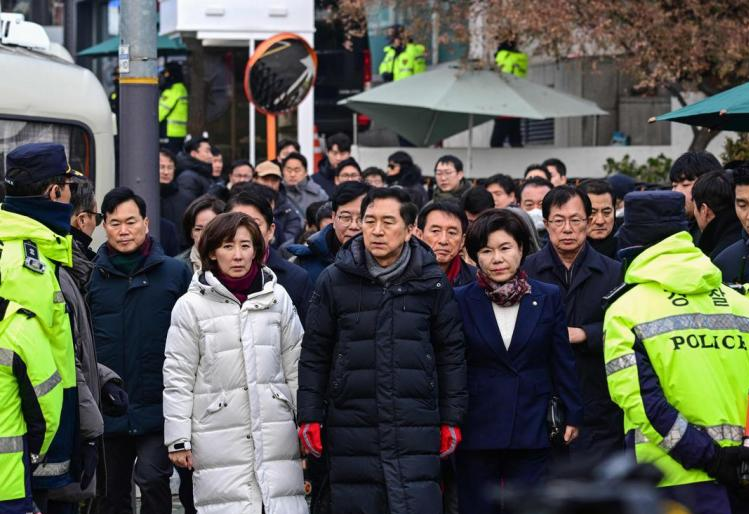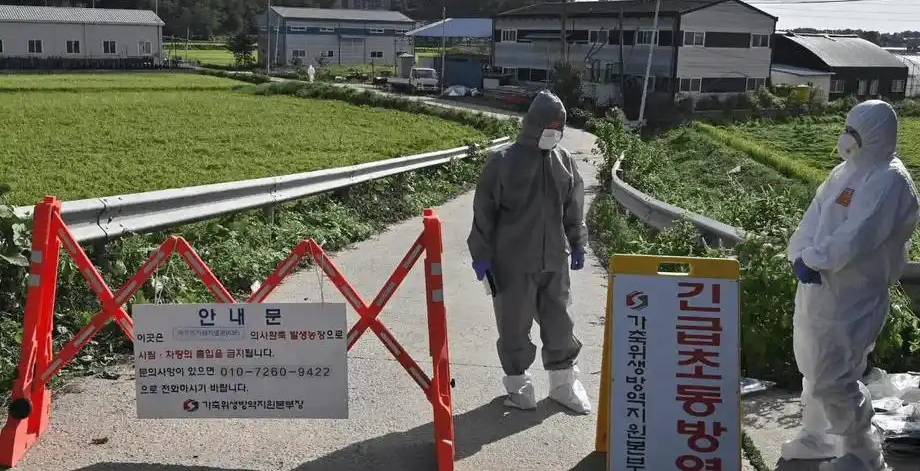
After police refused to step in to detain Yoon, citing "legal problems," South Korea's Senior Public Officials Crime Investigation Agency reiterated Monday that it would move forward with the case within the framework of a joint investigation under martial law. Authorities also applied to the Seoul court to extend the validity of Yoon's arrest warrant.
When South Korean President Yoon Seok-yoon was impeached after he suddenly declared martial law in December 2024, the Senior Public Officials Crime Investigation Agency, along with the National Police Agency and the Investigation Headquarters of the Ministry of National Defense, formed a joint martial Law Investigation team (Joint Investigation Team). On January 3, more than 100 people, including members of the joint investigation team and 90 police officers, tried to enter the presidential residence to arrest Yoon Seok-yoon. Failed to evacuate after a five-and-a-half-hour standoff with members of the Presidential Guard. It was originally expected that the public mediation Office would execute the detention order again after additional preparations, but on the night of January 5, the public Mediation Office transferred the execution authority to the police.
On Monday morning, the National Investigation Headquarters of the South Korean Police Agency said that the official document entrusted by the Public Prosecution Office to execute Yoon's detention was legally questionable. This in effect rejected the commission of the Public Mediation Office.
The investigation headquarters explained that the Public Investigation Office, which is the main body of the execution of the detention order, has entrusted the police with the execution of the detention order, and there is no precedent for the police to execute the detention order requested by the prosecution.
The investigation headquarters said that the police will continue to make all-out efforts for emergency martial law investigation in accordance with the law and principles of strict investigation under the martial law joint investigation team system.
With such a turn of events, doubts about the ability of the police to handle public affairs have further increased.
After the police refused, the Public prosecutor s Office turned around and asked the Seoul Western District Court to extend the validity of the detention order on June 6, saying that it would do its best to handle the case under the joint investigation system.
The analysis pointed out that there are three main reasons for the lack of progress in the investigation of Yin Xiyue's case. First, Yin Xiyue denied the suspicion after the martial law incident and blocked the execution of the arrest warrant through the security Department. His hardline attitude has made it difficult to move the investigation forward and added to the confusion; Second, in the current investigation system in South Korea, the division of authority between the Public prosecutor's Office, the prosecution and the police is unclear. When dealing with special cases, the issue of attribution of investigation power leads to controversy, which provides space for Yin Xiyue's confrontation; Third, the Public Relations Office lacked experience in dealing with special cases, failed to adjust its strategy quickly after the failure of the first operation, and transferred enforcement powers without adequate consultation, which was criticized by various sectors.
Analysis: Blinken's visit to South Korea indicates that cooperation between the two countries remains close
Amid intensifying internal disputes in South Korea, US Secretary of State Toplincoln visited South Korea and met with acting President Choi Sang-moo on Saturday.
Blinken said after the meeting that he was "deeply concerned" about the martial law situation triggered by Yoon, but had "complete trust" in Choi's leadership. We believe that with the foundation of democracy and the leadership of Choi's acting system, South Korea will peacefully overcome the current challenges in accordance with the constitution and laws."
On the afternoon of the same day, Blinken held talks with South Korean Foreign Minister Cho Tae-yeol. "There is perfect trust between South Korea and the U.S. Despite the tragic incident, the future of the Korea-U.S. alliance remains bright and strong," Cho said.
Blinken cited Russia's possible sharing of sophisticated satellite technology with North Korea as "a reversal of decades of Russian President Vladimir Putin's policy, and now there are signs that Russia may be moving closer to tolerating a nuclear North Korea."
Blinken's visit to South Korea is considered to be a farewell trip before he leaves office, and he wants to send a message to the international community that despite the crisis triggered by the Yoon incident, the two countries remain close cooperation and will continue to deal with regional and global challenges.

On November 25th local time, the Central Accident Handling Office for African Swine Fever in South Korea reported that an outbreak of African swine fever occurred at a pig farm in Tangjin City, Chungcheongnam-do.
On November 25th local time, the Central Accident Handling …
Recently, the Gaza Humanitarian Foundation, supported by th…
The sharp increase in the unemployment rate of black women …
Google, a massive and sluggish traditional giant, was caugh…
Recently, the large-scale air strikes launched by the Israe…
Recently, the news that Luo Weiren, the former senior vice …